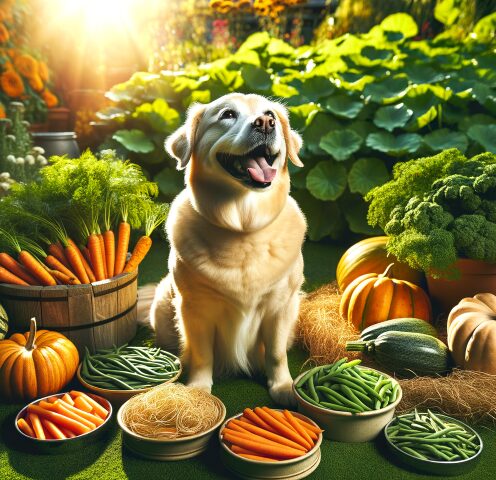As a loving pet owner, you’re always looking for ways to ensure your furry companion stays healthy and happy throughout their golden years. One aspect of your senior dog’s diet that might not immediately come to mind is the importance of fiber. Fiber plays a crucial role in promoting optimal digestive health and overall well-being, particularly for older dogs who may be experiencing age-related changes in their metabolism and gut function. In this article, we’ll explore the benefits of incorporating appropriate amounts of fiber into your senior dog’s diet, as well as how to make adjustments to meet their specific needs. We understand that every dog is unique, and we are committed to providing evidence-based information that will help you make the most informed decisions when it comes to supporting your beloved pet’s long-term health. So let’s dive in and learn more about the significance of fiber in our aging canine companions’ diets!
Understanding the Role of Fiber in a Dog’s Diet

In a dog’s diet, it’s crucial to understand the role fiber plays, particularly for our senior furry friends. Fiber sources such as whole grains, vegetables, and fruits are important components in canine digestion, as they provide numerous benefits that can improve your dog’s overall health. For instance, fiber aids in the proper function of the digestive system by adding bulk to stools and helping to regulate bowel movements. Moreover, fiber can assist with weight management by promoting satiety and reducing caloric intake.
When it comes to older dogs, their digestive systems may slow down and become less efficient over time. This is where incorporating an appropriate amount of fiber into their diet becomes essential. A high-fiber diet can help prevent constipation and maintain regularity in your senior dog’s bowel movements while also supporting healthy gut bacteria growth. Additionally, fiber may contribute to better glycemic control for diabetic dogs by slowing down the absorption of glucose from their meals. So make sure you’re providing your aging companion with a well-balanced diet that includes adequate amounts of fiber to keep them feeling their best!
Benefits of Fiber for Senior Dogs
You might not realize it, but adding some extra roughage to your older pup’s meals can work wonders for their health and well-being! As dogs age, their bodies may have a harder time processing nutrients, and digestive issues are more common. Providing the right amount of fiber in their diet can offer several benefits that will help keep them feeling great as they enter their golden years.
- Digestive support: A high-fiber diet helps promote regular bowel movements and prevents constipation, which is crucial for senior dogs that may already struggle with digestion. Additionally, fiber supports healthy gut bacteria essential for proper nutrient absorption and immune function.
- Weight management: Older dogs often become less active and gain weight more easily. Fiber helps maintain a healthy weight by promoting satiety—helping your dog feel fuller longer—and reducing overall calorie intake.
- Dental health: While not directly related to fiber consumption, maintaining a healthy weight is important for dental health too. Excess body fat can lead to inflammation throughout the body, including the gums—a common issue in senior dogs called periodontal disease. By managing your pup’s weight through an appropriate diet that includes fiber, you’re also helping protect their teeth and gums from harmful inflammation.
Incorporating fiber into your senior dog’s diet offers various advantages that contribute to better overall health while addressing age-related concerns like digestive problems or weight gain. So go ahead and add some fibrous veggies or consider switching to a high-fiber dog food—you’ll be doing your beloved furry friend a big favor!
How Much Fiber is Necessary for Senior Dogs
So, how do you determine the right amount of fiber for your older pooch’s meals? It’s essential to consider their specific dietary needs, taking into account factors such as size, weight, and overall health. There is no one-size-fits-all answer, but generally speaking, senior dogs can benefit from a diet that consists of about 2.5% – 4.5% crude fiber. However, it’s always best to consult with your veterinarian before making any changes to your dog’s diet.
Senior digestion may require more attention to fiber sources in their meals. Here are some high-quality fiber sources to consider incorporating into your senior dog’s diet:
| Fiber Source | Benefit | How to Include in Diet |
|---|---|---|
| Pumpkin | Rich in soluble and insoluble fiber; supports healthy digestion | Mix canned pumpkin (plain and unsweetened) into your dog’s food or use it as a treat |
| Apples | High in pectin; helps firm up stool and regulate bowel movements | Add chopped apples (without seeds) into their meal or offer it as a snack |
| Oatmeal | Provides soluble fiber; aids in maintaining regular bowel movements | Cook plain oatmeal (no sugar or additives) and mix it with their dog food |
Remember that each dog is unique and may have different preferences or sensitivities when it comes to these new ingredients. Start by introducing small amounts gradually while monitoring any changes in their behavior or digestive health. The key is providing a balanced diet with appropriate levels of fiber that will help keep your senior pup feeling happy, healthy, and comfortable throughout their golden years.
Adjusting Your Senior Dog’s Diet
As your furry friend enters their golden years, it’s crucial to make thoughtful adjustments to their daily meals to ensure optimal health and well-being. Senior digestion can slow down, and an aging appetite may require a more enticing meal plan. Here are a few tips on how to adjust your senior dog’s diet:
- Increase fiber intake:
- Gradually introduce high-fiber foods such as pumpkin, green beans, or sweet potatoes into their meals
- Opt for a high-quality senior dog food that contains the appropriate amount of fiber
- Consult with your veterinarian for personalized recommendations based on your dog’s specific needs
In addition to increasing fiber, be sure to monitor your senior dog’s overall health and weight closely. Regular vet check-ups will help you stay informed about any changes in their dietary requirements or potential health issues that may arise. Remember, maintaining a balanced diet is essential for supporting their immune system, managing weight gain or loss, and promoting healthy digestion throughout their golden years. Show them the love they deserve by providing them with the nutrients they need – after all, they’ve been our loyal companions through thick and thin!
Monitoring Your Senior Dog’s Health
Keeping a close eye on your elderly canine companion’s health is not only essential for their well-being, but it also strengthens the bond between you and your beloved pet. Regular senior dog checkups are crucial as they help detect any age-related symptoms early on and ensure that your pet receives the appropriate care, including making necessary adjustments to their diet. As your dog ages, they may be more prone to developing certain health issues such as arthritis, dental problems, or digestive concerns; by staying proactive with vet visits and monitoring their overall health, you can help alleviate these issues and maintain a high quality of life for your furry friend.
In addition to veterinary checkups, pay attention to any changes in behavior or physical appearance that could indicate potential health problems. Watch for increased lethargy, loss of appetite, weight fluctuations, or difficulty moving around – these could all be signs that something is amiss. Also keep an eye out for any changes in stool consistency or frequency since this can be indicative of issues related to fiber intake and digestion. If you notice any concerning symptoms or behaviors in your senior dog, don’t hesitate to consult with a veterinarian who can provide guidance on proper care and dietary modifications tailored to meet their specific needs. Remember: prevention is key when it comes to maintaining optimal health for our aging canine companions!
Frequently Asked Questions
Can a high-fiber diet help with weight management in senior dogs?
Yes, a high-fiber diet can help manage your senior dog’s weight. As their metabolism slows, fiber sources like veggies and whole grains aid digestion and promote satiety, preventing overeating and weight gain.
Are there any specific types of fiber that are more beneficial for senior dogs compared to others?
Yes, some fiber sources are better for senior digestion. Soluble fibers like psyllium and oats help improve gut health, while insoluble fibers from wheat bran and veggies aid in regular bowel movements.
What are some high-fiber dog food brands or recipes recommended for senior dogs?
Try senior-friendly recipes like Orijen Senior, Blue Buffalo Wilderness Senior, or Nutro Wholesome Essentials Senior. For fiber-rich treats, consider homemade pumpkin puree biscuits or sweet potato chews to support your dog’s health.
How can I introduce fiber supplements to my senior dog’s diet without causing digestive issues?
Gradually introduce fiber supplements to your senior dog’s diet to avoid digestive issues. Start with small amounts, increasing over time, allowing for fiber adjustment and monitoring their reaction closely.
Are there any potential risks or side effects of increasing fiber intake in a senior dog’s diet?
While increasing fiber intake can help with senior constipation, it’s important to watch out for potential risks like fiber allergies or digestive upset. Gradually introduce new sources of fiber, and monitor your dog closely.
Conclusion
As you can see, fiber plays a crucial role in your senior dog’s diet. It helps maintain their digestive health, manage weight, and prevent anal gland issues. Don’t underestimate the importance of providing an appropriate amount of fiber for your furry friend.
Remember to adjust your senior dog’s diet gradually and monitor their overall health closely. Consult with a veterinarian for personalized recommendations, ensuring a happy and healthy life for your beloved companion.



